Cultural Intelligence Impact on Business Negotiation at Unilever
VerifiedAdded on 2023/06/08
|19
|7067
|350
Report
AI Summary
This research project investigates the impact of cultural intelligence on business negotiation within Unilever, a multinational consumer goods company. The report begins with an introduction, outlining the research aims, objectives, questions, scope, and limitations, followed by a literature review that explores theories of culture and the role of cultural intelligence in business negotiations. The methodology section details the research approach, while the data analysis and interpretation chapters present the findings. The study identifies challenges in cross-cultural negotiation, such as communication barriers and differing mindsets among employees from diverse backgrounds. The research aims to analyze the impact of cultural intelligence on business negotiation, exploring the role of cultural intelligence and identifying factors impacting negotiation in the workplace. The conclusion and recommendations chapter summarizes the findings and suggests strategies for improvement. The research utilizes the Saunders research onion framework. The research paper emphasizes the importance of cultural intelligence for companies to succeed in a globalized world and offers insights into how Unilever can improve its negotiation strategies.
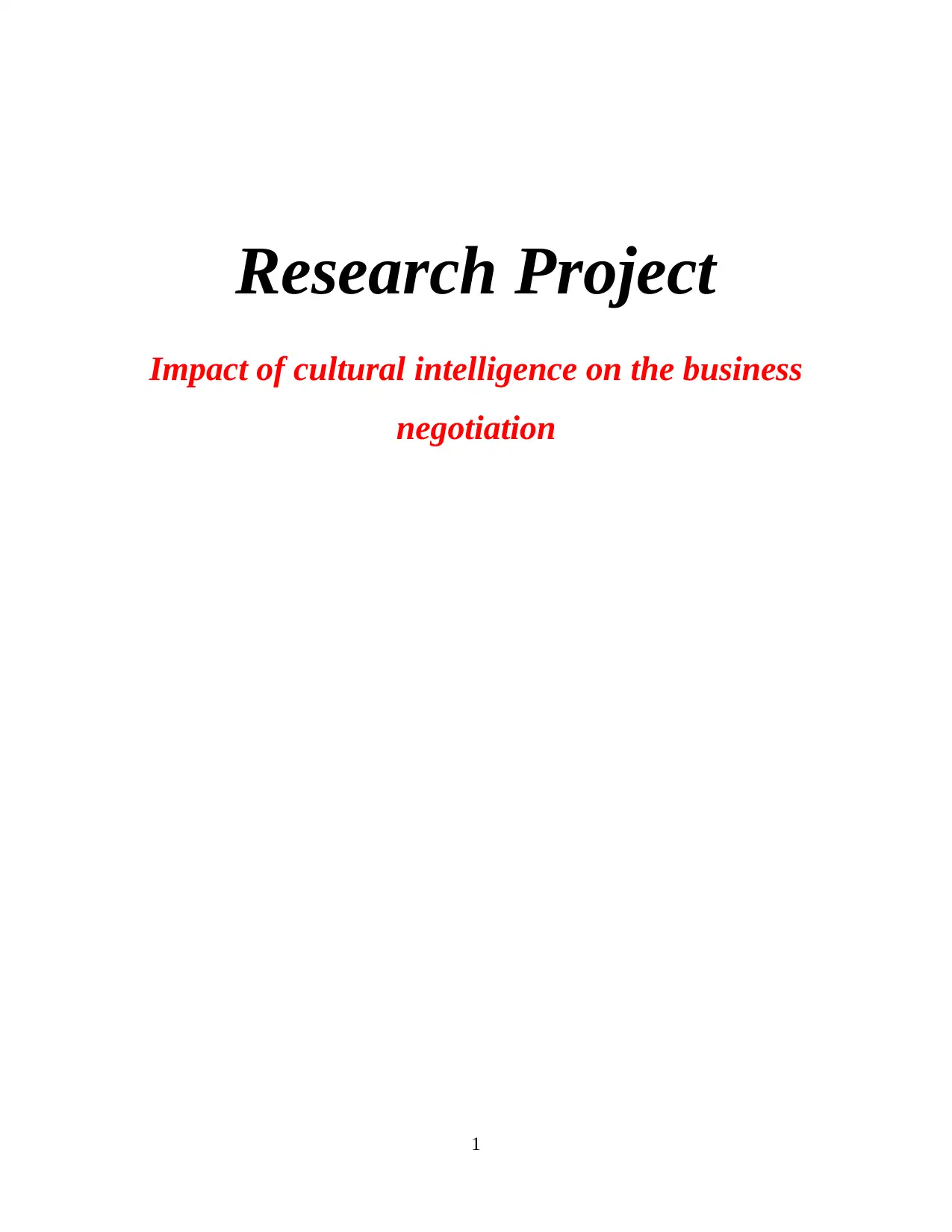
Research Project
Impact of cultural intelligence on the business
negotiation
1
Impact of cultural intelligence on the business
negotiation
1
Paraphrase This Document
Need a fresh take? Get an instant paraphrase of this document with our AI Paraphraser
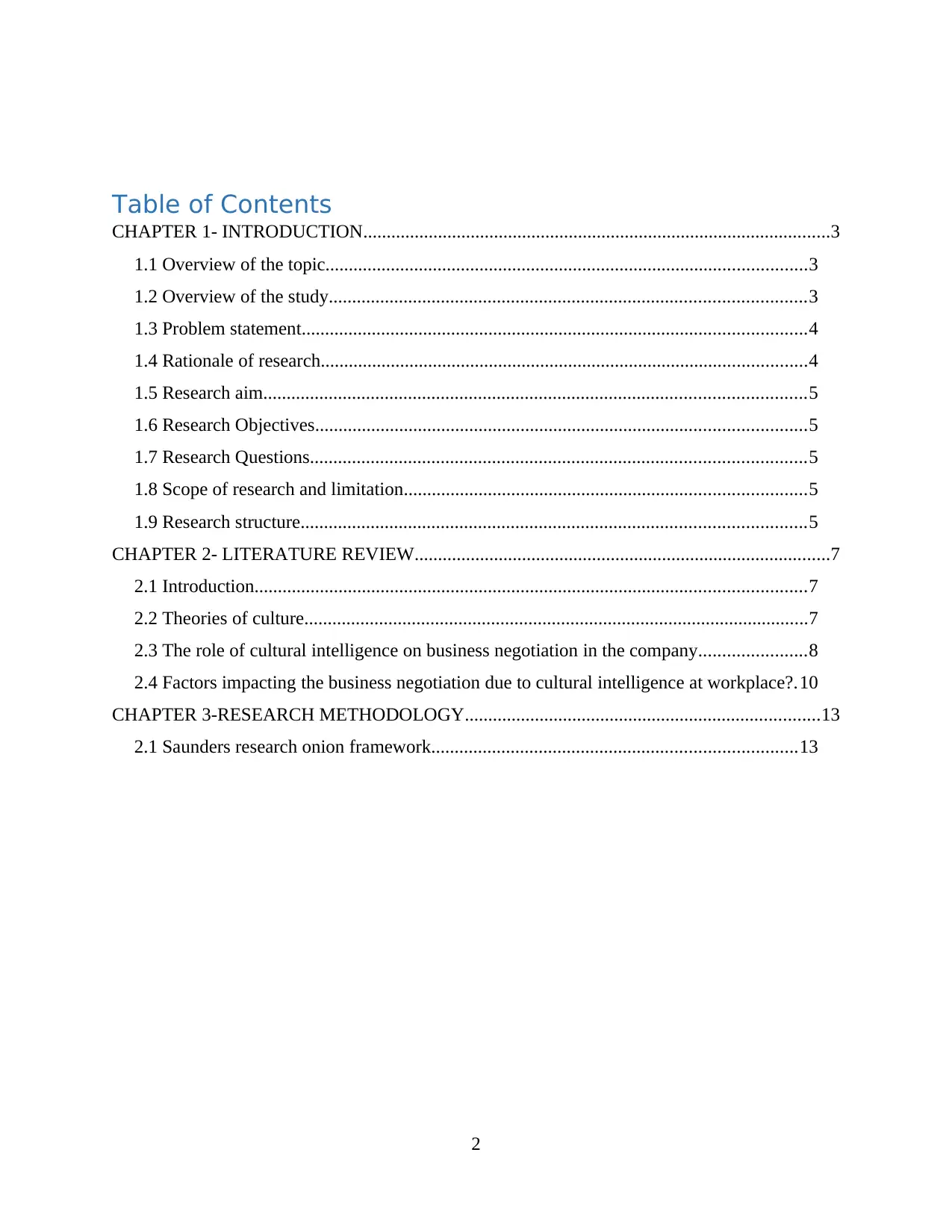
Table of Contents
CHAPTER 1- INTRODUCTION....................................................................................................3
1.1 Overview of the topic.......................................................................................................3
1.2 Overview of the study......................................................................................................3
1.3 Problem statement............................................................................................................4
1.4 Rationale of research........................................................................................................4
1.5 Research aim....................................................................................................................5
1.6 Research Objectives.........................................................................................................5
1.7 Research Questions..........................................................................................................5
1.8 Scope of research and limitation......................................................................................5
1.9 Research structure............................................................................................................5
CHAPTER 2- LITERATURE REVIEW.........................................................................................7
2.1 Introduction......................................................................................................................7
2.2 Theories of culture............................................................................................................7
2.3 The role of cultural intelligence on business negotiation in the company.......................8
2.4 Factors impacting the business negotiation due to cultural intelligence at workplace?.10
CHAPTER 3-RESEARCH METHODOLOGY............................................................................13
2.1 Saunders research onion framework..............................................................................13
2
CHAPTER 1- INTRODUCTION....................................................................................................3
1.1 Overview of the topic.......................................................................................................3
1.2 Overview of the study......................................................................................................3
1.3 Problem statement............................................................................................................4
1.4 Rationale of research........................................................................................................4
1.5 Research aim....................................................................................................................5
1.6 Research Objectives.........................................................................................................5
1.7 Research Questions..........................................................................................................5
1.8 Scope of research and limitation......................................................................................5
1.9 Research structure............................................................................................................5
CHAPTER 2- LITERATURE REVIEW.........................................................................................7
2.1 Introduction......................................................................................................................7
2.2 Theories of culture............................................................................................................7
2.3 The role of cultural intelligence on business negotiation in the company.......................8
2.4 Factors impacting the business negotiation due to cultural intelligence at workplace?.10
CHAPTER 3-RESEARCH METHODOLOGY............................................................................13
2.1 Saunders research onion framework..............................................................................13
2
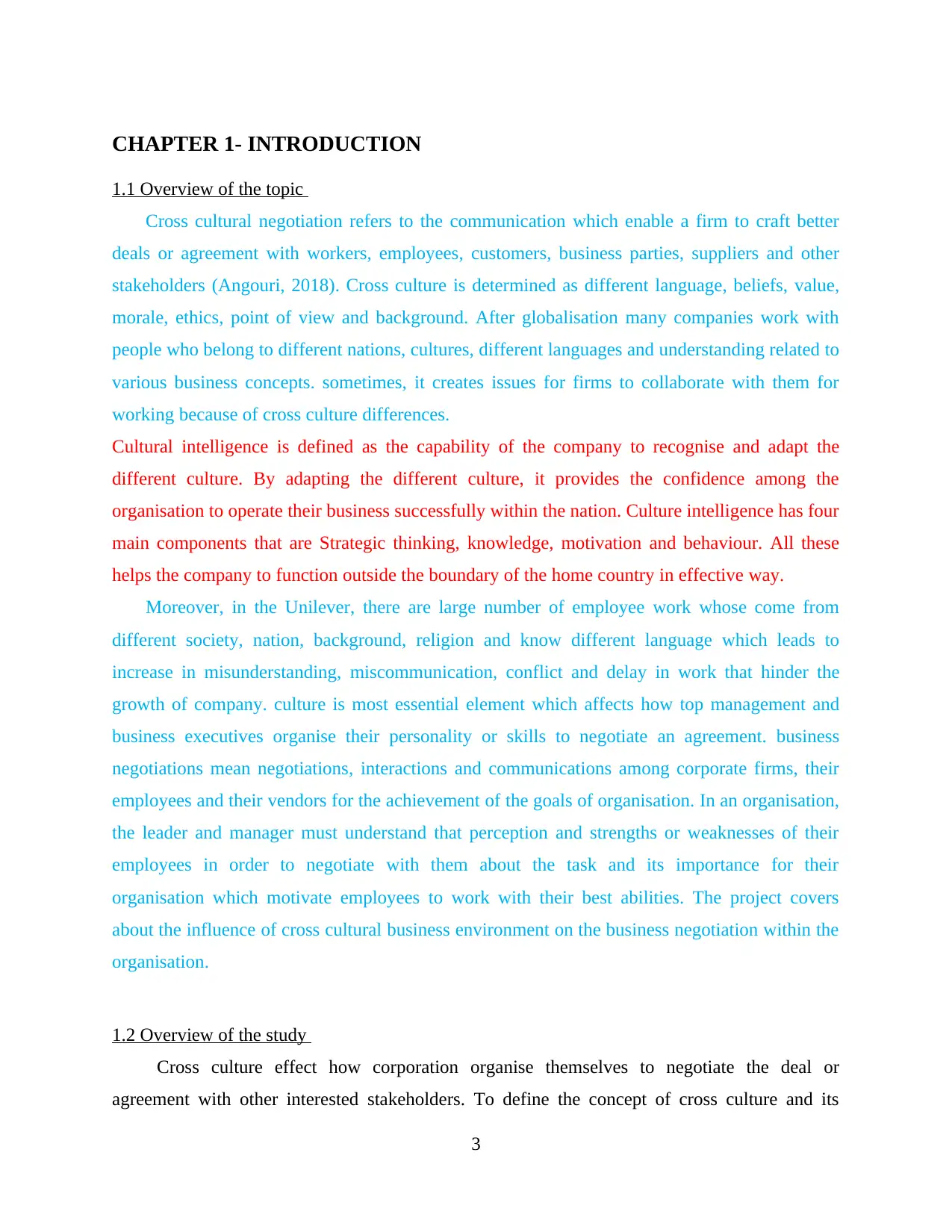
CHAPTER 1- INTRODUCTION
1.1 Overview of the topic
Cross cultural negotiation refers to the communication which enable a firm to craft better
deals or agreement with workers, employees, customers, business parties, suppliers and other
stakeholders (Angouri, 2018). Cross culture is determined as different language, beliefs, value,
morale, ethics, point of view and background. After globalisation many companies work with
people who belong to different nations, cultures, different languages and understanding related to
various business concepts. sometimes, it creates issues for firms to collaborate with them for
working because of cross culture differences.
Cultural intelligence is defined as the capability of the company to recognise and adapt the
different culture. By adapting the different culture, it provides the confidence among the
organisation to operate their business successfully within the nation. Culture intelligence has four
main components that are Strategic thinking, knowledge, motivation and behaviour. All these
helps the company to function outside the boundary of the home country in effective way.
Moreover, in the Unilever, there are large number of employee work whose come from
different society, nation, background, religion and know different language which leads to
increase in misunderstanding, miscommunication, conflict and delay in work that hinder the
growth of company. culture is most essential element which affects how top management and
business executives organise their personality or skills to negotiate an agreement. business
negotiations mean negotiations, interactions and communications among corporate firms, their
employees and their vendors for the achievement of the goals of organisation. In an organisation,
the leader and manager must understand that perception and strengths or weaknesses of their
employees in order to negotiate with them about the task and its importance for their
organisation which motivate employees to work with their best abilities. The project covers
about the influence of cross cultural business environment on the business negotiation within the
organisation.
1.2 Overview of the study
Cross culture effect how corporation organise themselves to negotiate the deal or
agreement with other interested stakeholders. To define the concept of cross culture and its
3
1.1 Overview of the topic
Cross cultural negotiation refers to the communication which enable a firm to craft better
deals or agreement with workers, employees, customers, business parties, suppliers and other
stakeholders (Angouri, 2018). Cross culture is determined as different language, beliefs, value,
morale, ethics, point of view and background. After globalisation many companies work with
people who belong to different nations, cultures, different languages and understanding related to
various business concepts. sometimes, it creates issues for firms to collaborate with them for
working because of cross culture differences.
Cultural intelligence is defined as the capability of the company to recognise and adapt the
different culture. By adapting the different culture, it provides the confidence among the
organisation to operate their business successfully within the nation. Culture intelligence has four
main components that are Strategic thinking, knowledge, motivation and behaviour. All these
helps the company to function outside the boundary of the home country in effective way.
Moreover, in the Unilever, there are large number of employee work whose come from
different society, nation, background, religion and know different language which leads to
increase in misunderstanding, miscommunication, conflict and delay in work that hinder the
growth of company. culture is most essential element which affects how top management and
business executives organise their personality or skills to negotiate an agreement. business
negotiations mean negotiations, interactions and communications among corporate firms, their
employees and their vendors for the achievement of the goals of organisation. In an organisation,
the leader and manager must understand that perception and strengths or weaknesses of their
employees in order to negotiate with them about the task and its importance for their
organisation which motivate employees to work with their best abilities. The project covers
about the influence of cross cultural business environment on the business negotiation within the
organisation.
1.2 Overview of the study
Cross culture effect how corporation organise themselves to negotiate the deal or
agreement with other interested stakeholders. To define the concept of cross culture and its
3
⊘ This is a preview!⊘
Do you want full access?
Subscribe today to unlock all pages.

Trusted by 1+ million students worldwide
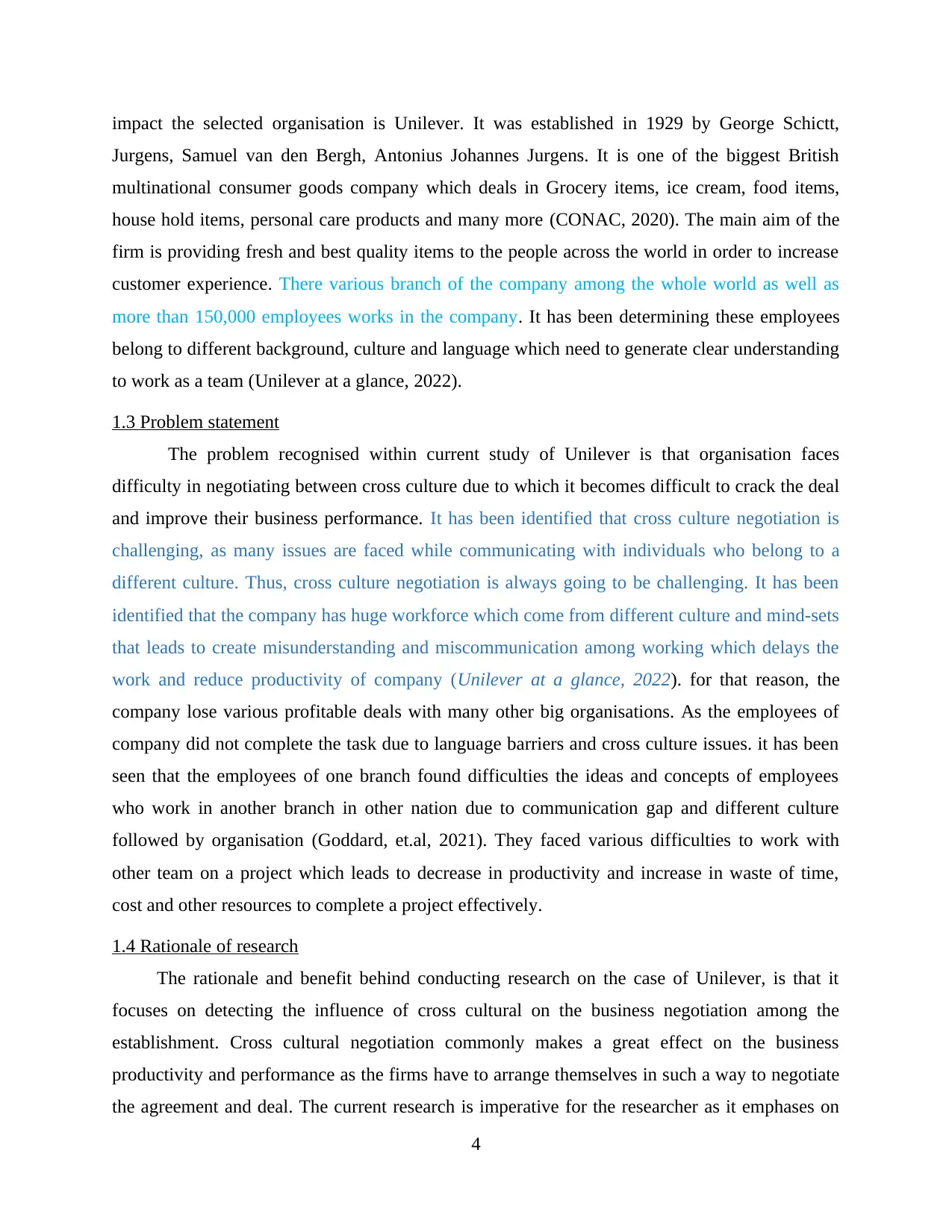
impact the selected organisation is Unilever. It was established in 1929 by George Schictt,
Jurgens, Samuel van den Bergh, Antonius Johannes Jurgens. It is one of the biggest British
multinational consumer goods company which deals in Grocery items, ice cream, food items,
house hold items, personal care products and many more (CONAC, 2020). The main aim of the
firm is providing fresh and best quality items to the people across the world in order to increase
customer experience. There various branch of the company among the whole world as well as
more than 150,000 employees works in the company. It has been determining these employees
belong to different background, culture and language which need to generate clear understanding
to work as a team (Unilever at a glance, 2022).
1.3 Problem statement
The problem recognised within current study of Unilever is that organisation faces
difficulty in negotiating between cross culture due to which it becomes difficult to crack the deal
and improve their business performance. It has been identified that cross culture negotiation is
challenging, as many issues are faced while communicating with individuals who belong to a
different culture. Thus, cross culture negotiation is always going to be challenging. It has been
identified that the company has huge workforce which come from different culture and mind-sets
that leads to create misunderstanding and miscommunication among working which delays the
work and reduce productivity of company (Unilever at a glance, 2022). for that reason, the
company lose various profitable deals with many other big organisations. As the employees of
company did not complete the task due to language barriers and cross culture issues. it has been
seen that the employees of one branch found difficulties the ideas and concepts of employees
who work in another branch in other nation due to communication gap and different culture
followed by organisation (Goddard, et.al, 2021). They faced various difficulties to work with
other team on a project which leads to decrease in productivity and increase in waste of time,
cost and other resources to complete a project effectively.
1.4 Rationale of research
The rationale and benefit behind conducting research on the case of Unilever, is that it
focuses on detecting the influence of cross cultural on the business negotiation among the
establishment. Cross cultural negotiation commonly makes a great effect on the business
productivity and performance as the firms have to arrange themselves in such a way to negotiate
the agreement and deal. The current research is imperative for the researcher as it emphases on
4
Jurgens, Samuel van den Bergh, Antonius Johannes Jurgens. It is one of the biggest British
multinational consumer goods company which deals in Grocery items, ice cream, food items,
house hold items, personal care products and many more (CONAC, 2020). The main aim of the
firm is providing fresh and best quality items to the people across the world in order to increase
customer experience. There various branch of the company among the whole world as well as
more than 150,000 employees works in the company. It has been determining these employees
belong to different background, culture and language which need to generate clear understanding
to work as a team (Unilever at a glance, 2022).
1.3 Problem statement
The problem recognised within current study of Unilever is that organisation faces
difficulty in negotiating between cross culture due to which it becomes difficult to crack the deal
and improve their business performance. It has been identified that cross culture negotiation is
challenging, as many issues are faced while communicating with individuals who belong to a
different culture. Thus, cross culture negotiation is always going to be challenging. It has been
identified that the company has huge workforce which come from different culture and mind-sets
that leads to create misunderstanding and miscommunication among working which delays the
work and reduce productivity of company (Unilever at a glance, 2022). for that reason, the
company lose various profitable deals with many other big organisations. As the employees of
company did not complete the task due to language barriers and cross culture issues. it has been
seen that the employees of one branch found difficulties the ideas and concepts of employees
who work in another branch in other nation due to communication gap and different culture
followed by organisation (Goddard, et.al, 2021). They faced various difficulties to work with
other team on a project which leads to decrease in productivity and increase in waste of time,
cost and other resources to complete a project effectively.
1.4 Rationale of research
The rationale and benefit behind conducting research on the case of Unilever, is that it
focuses on detecting the influence of cross cultural on the business negotiation among the
establishment. Cross cultural negotiation commonly makes a great effect on the business
productivity and performance as the firms have to arrange themselves in such a way to negotiate
the agreement and deal. The current research is imperative for the researcher as it emphases on
4
Paraphrase This Document
Need a fresh take? Get an instant paraphrase of this document with our AI Paraphraser
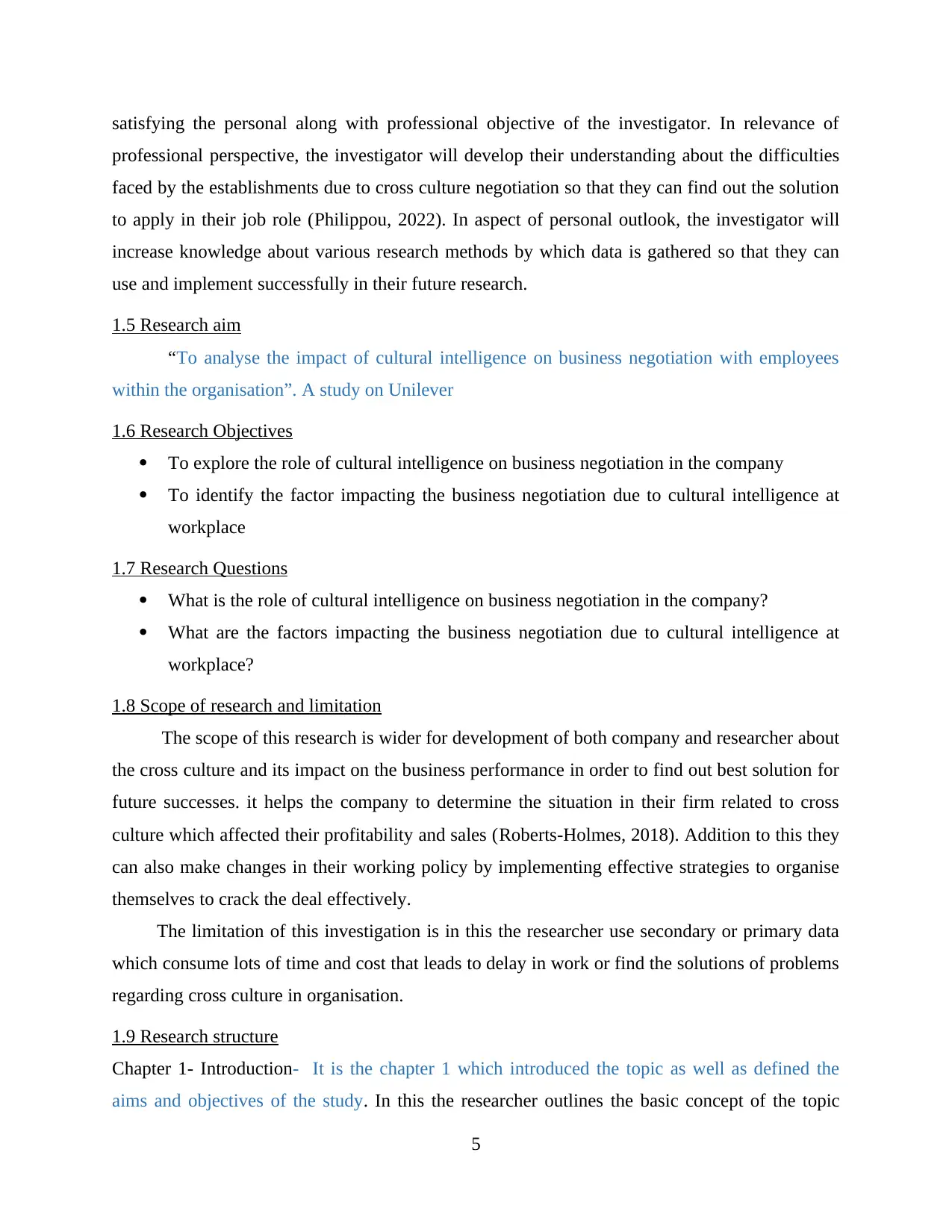
satisfying the personal along with professional objective of the investigator. In relevance of
professional perspective, the investigator will develop their understanding about the difficulties
faced by the establishments due to cross culture negotiation so that they can find out the solution
to apply in their job role (Philippou, 2022). In aspect of personal outlook, the investigator will
increase knowledge about various research methods by which data is gathered so that they can
use and implement successfully in their future research.
1.5 Research aim
“To analyse the impact of cultural intelligence on business negotiation with employees
within the organisation”. A study on Unilever
1.6 Research Objectives
To explore the role of cultural intelligence on business negotiation in the company
To identify the factor impacting the business negotiation due to cultural intelligence at
workplace
1.7 Research Questions
What is the role of cultural intelligence on business negotiation in the company?
What are the factors impacting the business negotiation due to cultural intelligence at
workplace?
1.8 Scope of research and limitation
The scope of this research is wider for development of both company and researcher about
the cross culture and its impact on the business performance in order to find out best solution for
future successes. it helps the company to determine the situation in their firm related to cross
culture which affected their profitability and sales (Roberts-Holmes, 2018). Addition to this they
can also make changes in their working policy by implementing effective strategies to organise
themselves to crack the deal effectively.
The limitation of this investigation is in this the researcher use secondary or primary data
which consume lots of time and cost that leads to delay in work or find the solutions of problems
regarding cross culture in organisation.
1.9 Research structure
Chapter 1- Introduction- It is the chapter 1 which introduced the topic as well as defined the
aims and objectives of the study. In this the researcher outlines the basic concept of the topic
5
professional perspective, the investigator will develop their understanding about the difficulties
faced by the establishments due to cross culture negotiation so that they can find out the solution
to apply in their job role (Philippou, 2022). In aspect of personal outlook, the investigator will
increase knowledge about various research methods by which data is gathered so that they can
use and implement successfully in their future research.
1.5 Research aim
“To analyse the impact of cultural intelligence on business negotiation with employees
within the organisation”. A study on Unilever
1.6 Research Objectives
To explore the role of cultural intelligence on business negotiation in the company
To identify the factor impacting the business negotiation due to cultural intelligence at
workplace
1.7 Research Questions
What is the role of cultural intelligence on business negotiation in the company?
What are the factors impacting the business negotiation due to cultural intelligence at
workplace?
1.8 Scope of research and limitation
The scope of this research is wider for development of both company and researcher about
the cross culture and its impact on the business performance in order to find out best solution for
future successes. it helps the company to determine the situation in their firm related to cross
culture which affected their profitability and sales (Roberts-Holmes, 2018). Addition to this they
can also make changes in their working policy by implementing effective strategies to organise
themselves to crack the deal effectively.
The limitation of this investigation is in this the researcher use secondary or primary data
which consume lots of time and cost that leads to delay in work or find the solutions of problems
regarding cross culture in organisation.
1.9 Research structure
Chapter 1- Introduction- It is the chapter 1 which introduced the topic as well as defined the
aims and objectives of the study. In this the researcher outlines the basic concept of the topic
5
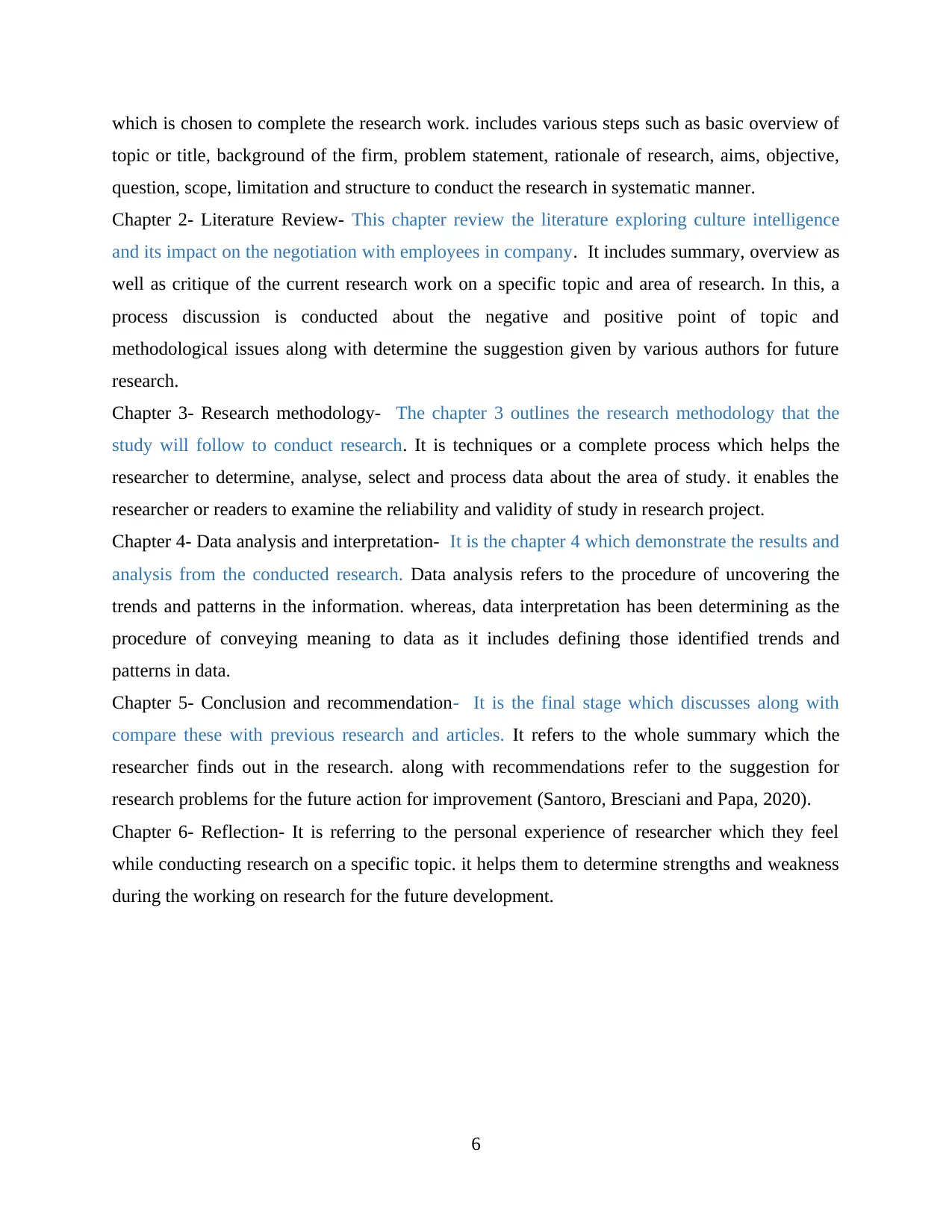
which is chosen to complete the research work. includes various steps such as basic overview of
topic or title, background of the firm, problem statement, rationale of research, aims, objective,
question, scope, limitation and structure to conduct the research in systematic manner.
Chapter 2- Literature Review- This chapter review the literature exploring culture intelligence
and its impact on the negotiation with employees in company. It includes summary, overview as
well as critique of the current research work on a specific topic and area of research. In this, a
process discussion is conducted about the negative and positive point of topic and
methodological issues along with determine the suggestion given by various authors for future
research.
Chapter 3- Research methodology- The chapter 3 outlines the research methodology that the
study will follow to conduct research. It is techniques or a complete process which helps the
researcher to determine, analyse, select and process data about the area of study. it enables the
researcher or readers to examine the reliability and validity of study in research project.
Chapter 4- Data analysis and interpretation- It is the chapter 4 which demonstrate the results and
analysis from the conducted research. Data analysis refers to the procedure of uncovering the
trends and patterns in the information. whereas, data interpretation has been determining as the
procedure of conveying meaning to data as it includes defining those identified trends and
patterns in data.
Chapter 5- Conclusion and recommendation- It is the final stage which discusses along with
compare these with previous research and articles. It refers to the whole summary which the
researcher finds out in the research. along with recommendations refer to the suggestion for
research problems for the future action for improvement (Santoro, Bresciani and Papa, 2020).
Chapter 6- Reflection- It is referring to the personal experience of researcher which they feel
while conducting research on a specific topic. it helps them to determine strengths and weakness
during the working on research for the future development.
6
topic or title, background of the firm, problem statement, rationale of research, aims, objective,
question, scope, limitation and structure to conduct the research in systematic manner.
Chapter 2- Literature Review- This chapter review the literature exploring culture intelligence
and its impact on the negotiation with employees in company. It includes summary, overview as
well as critique of the current research work on a specific topic and area of research. In this, a
process discussion is conducted about the negative and positive point of topic and
methodological issues along with determine the suggestion given by various authors for future
research.
Chapter 3- Research methodology- The chapter 3 outlines the research methodology that the
study will follow to conduct research. It is techniques or a complete process which helps the
researcher to determine, analyse, select and process data about the area of study. it enables the
researcher or readers to examine the reliability and validity of study in research project.
Chapter 4- Data analysis and interpretation- It is the chapter 4 which demonstrate the results and
analysis from the conducted research. Data analysis refers to the procedure of uncovering the
trends and patterns in the information. whereas, data interpretation has been determining as the
procedure of conveying meaning to data as it includes defining those identified trends and
patterns in data.
Chapter 5- Conclusion and recommendation- It is the final stage which discusses along with
compare these with previous research and articles. It refers to the whole summary which the
researcher finds out in the research. along with recommendations refer to the suggestion for
research problems for the future action for improvement (Santoro, Bresciani and Papa, 2020).
Chapter 6- Reflection- It is referring to the personal experience of researcher which they feel
while conducting research on a specific topic. it helps them to determine strengths and weakness
during the working on research for the future development.
6
⊘ This is a preview!⊘
Do you want full access?
Subscribe today to unlock all pages.

Trusted by 1+ million students worldwide
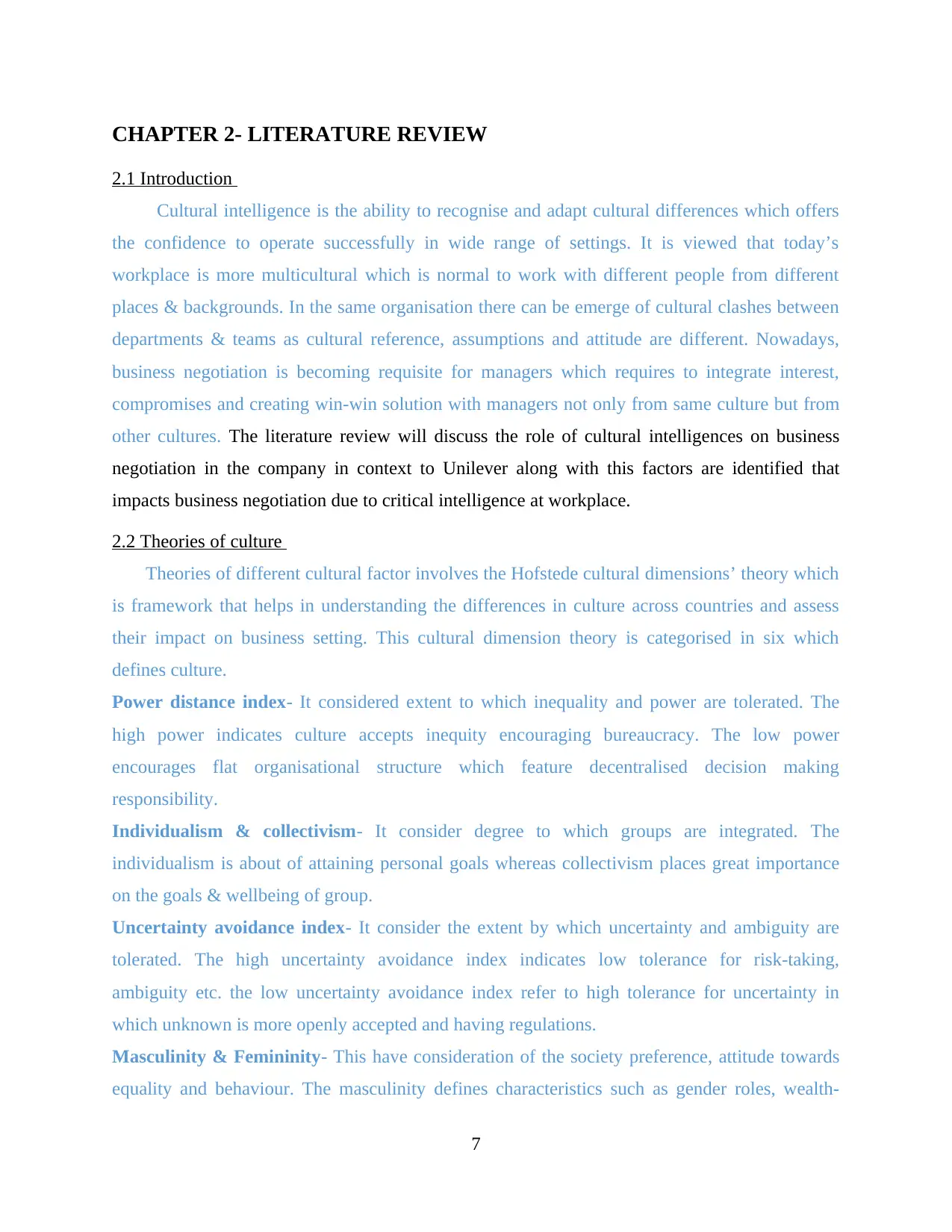
CHAPTER 2- LITERATURE REVIEW
2.1 Introduction
Cultural intelligence is the ability to recognise and adapt cultural differences which offers
the confidence to operate successfully in wide range of settings. It is viewed that today’s
workplace is more multicultural which is normal to work with different people from different
places & backgrounds. In the same organisation there can be emerge of cultural clashes between
departments & teams as cultural reference, assumptions and attitude are different. Nowadays,
business negotiation is becoming requisite for managers which requires to integrate interest,
compromises and creating win-win solution with managers not only from same culture but from
other cultures. The literature review will discuss the role of cultural intelligences on business
negotiation in the company in context to Unilever along with this factors are identified that
impacts business negotiation due to critical intelligence at workplace.
2.2 Theories of culture
Theories of different cultural factor involves the Hofstede cultural dimensions’ theory which
is framework that helps in understanding the differences in culture across countries and assess
their impact on business setting. This cultural dimension theory is categorised in six which
defines culture.
Power distance index- It considered extent to which inequality and power are tolerated. The
high power indicates culture accepts inequity encouraging bureaucracy. The low power
encourages flat organisational structure which feature decentralised decision making
responsibility.
Individualism & collectivism- It consider degree to which groups are integrated. The
individualism is about of attaining personal goals whereas collectivism places great importance
on the goals & wellbeing of group.
Uncertainty avoidance index- It consider the extent by which uncertainty and ambiguity are
tolerated. The high uncertainty avoidance index indicates low tolerance for risk-taking,
ambiguity etc. the low uncertainty avoidance index refer to high tolerance for uncertainty in
which unknown is more openly accepted and having regulations.
Masculinity & Femininity- This have consideration of the society preference, attitude towards
equality and behaviour. The masculinity defines characteristics such as gender roles, wealth-
7
2.1 Introduction
Cultural intelligence is the ability to recognise and adapt cultural differences which offers
the confidence to operate successfully in wide range of settings. It is viewed that today’s
workplace is more multicultural which is normal to work with different people from different
places & backgrounds. In the same organisation there can be emerge of cultural clashes between
departments & teams as cultural reference, assumptions and attitude are different. Nowadays,
business negotiation is becoming requisite for managers which requires to integrate interest,
compromises and creating win-win solution with managers not only from same culture but from
other cultures. The literature review will discuss the role of cultural intelligences on business
negotiation in the company in context to Unilever along with this factors are identified that
impacts business negotiation due to critical intelligence at workplace.
2.2 Theories of culture
Theories of different cultural factor involves the Hofstede cultural dimensions’ theory which
is framework that helps in understanding the differences in culture across countries and assess
their impact on business setting. This cultural dimension theory is categorised in six which
defines culture.
Power distance index- It considered extent to which inequality and power are tolerated. The
high power indicates culture accepts inequity encouraging bureaucracy. The low power
encourages flat organisational structure which feature decentralised decision making
responsibility.
Individualism & collectivism- It consider degree to which groups are integrated. The
individualism is about of attaining personal goals whereas collectivism places great importance
on the goals & wellbeing of group.
Uncertainty avoidance index- It consider the extent by which uncertainty and ambiguity are
tolerated. The high uncertainty avoidance index indicates low tolerance for risk-taking,
ambiguity etc. the low uncertainty avoidance index refer to high tolerance for uncertainty in
which unknown is more openly accepted and having regulations.
Masculinity & Femininity- This have consideration of the society preference, attitude towards
equality and behaviour. The masculinity defines characteristics such as gender roles, wealth-
7
Paraphrase This Document
Need a fresh take? Get an instant paraphrase of this document with our AI Paraphraser
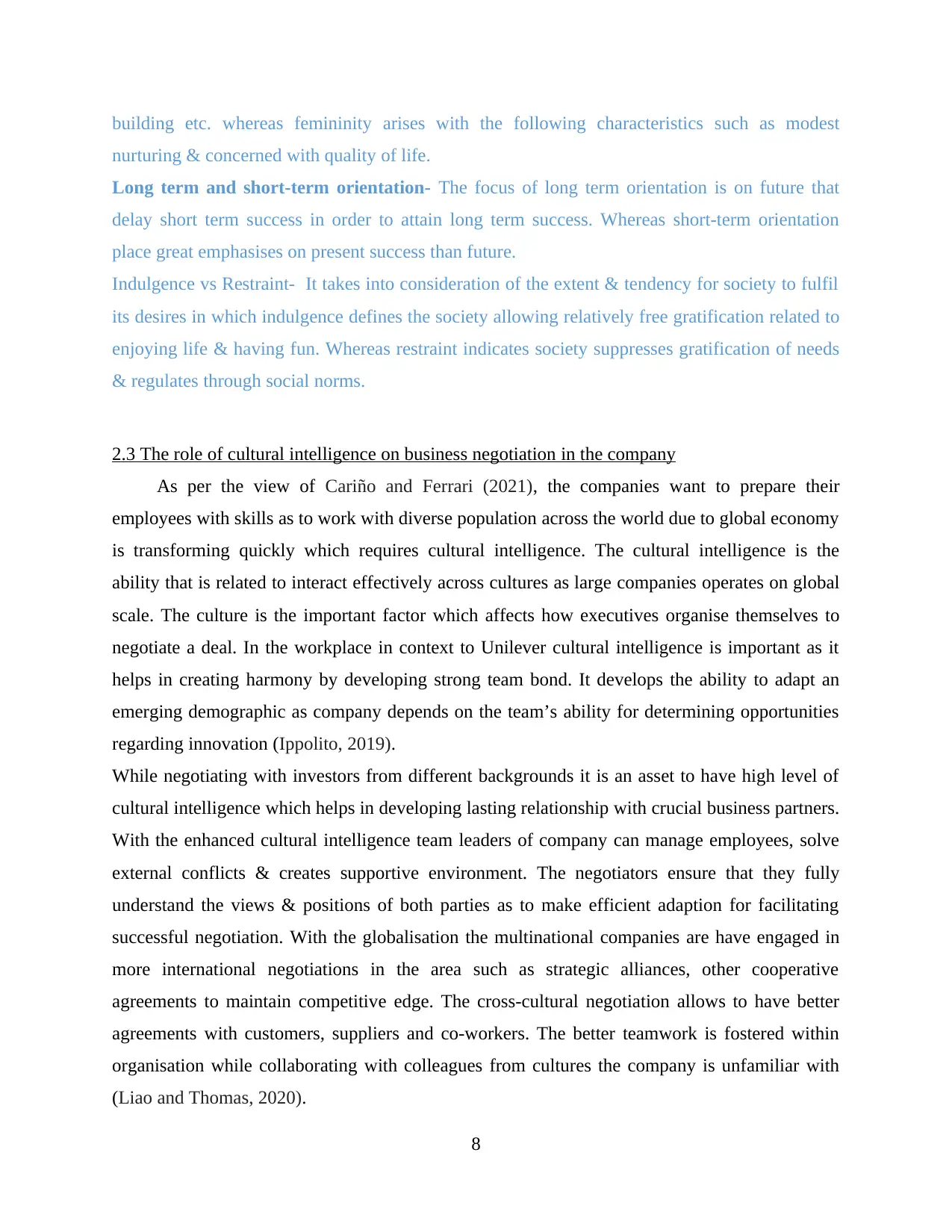
building etc. whereas femininity arises with the following characteristics such as modest
nurturing & concerned with quality of life.
Long term and short-term orientation- The focus of long term orientation is on future that
delay short term success in order to attain long term success. Whereas short-term orientation
place great emphasises on present success than future.
Indulgence vs Restraint- It takes into consideration of the extent & tendency for society to fulfil
its desires in which indulgence defines the society allowing relatively free gratification related to
enjoying life & having fun. Whereas restraint indicates society suppresses gratification of needs
& regulates through social norms.
2.3 The role of cultural intelligence on business negotiation in the company
As per the view of Cariño and Ferrari (2021), the companies want to prepare their
employees with skills as to work with diverse population across the world due to global economy
is transforming quickly which requires cultural intelligence. The cultural intelligence is the
ability that is related to interact effectively across cultures as large companies operates on global
scale. The culture is the important factor which affects how executives organise themselves to
negotiate a deal. In the workplace in context to Unilever cultural intelligence is important as it
helps in creating harmony by developing strong team bond. It develops the ability to adapt an
emerging demographic as company depends on the team’s ability for determining opportunities
regarding innovation (Ippolito, 2019).
While negotiating with investors from different backgrounds it is an asset to have high level of
cultural intelligence which helps in developing lasting relationship with crucial business partners.
With the enhanced cultural intelligence team leaders of company can manage employees, solve
external conflicts & creates supportive environment. The negotiators ensure that they fully
understand the views & positions of both parties as to make efficient adaption for facilitating
successful negotiation. With the globalisation the multinational companies are have engaged in
more international negotiations in the area such as strategic alliances, other cooperative
agreements to maintain competitive edge. The cross-cultural negotiation allows to have better
agreements with customers, suppliers and co-workers. The better teamwork is fostered within
organisation while collaborating with colleagues from cultures the company is unfamiliar with
(Liao and Thomas, 2020).
8
nurturing & concerned with quality of life.
Long term and short-term orientation- The focus of long term orientation is on future that
delay short term success in order to attain long term success. Whereas short-term orientation
place great emphasises on present success than future.
Indulgence vs Restraint- It takes into consideration of the extent & tendency for society to fulfil
its desires in which indulgence defines the society allowing relatively free gratification related to
enjoying life & having fun. Whereas restraint indicates society suppresses gratification of needs
& regulates through social norms.
2.3 The role of cultural intelligence on business negotiation in the company
As per the view of Cariño and Ferrari (2021), the companies want to prepare their
employees with skills as to work with diverse population across the world due to global economy
is transforming quickly which requires cultural intelligence. The cultural intelligence is the
ability that is related to interact effectively across cultures as large companies operates on global
scale. The culture is the important factor which affects how executives organise themselves to
negotiate a deal. In the workplace in context to Unilever cultural intelligence is important as it
helps in creating harmony by developing strong team bond. It develops the ability to adapt an
emerging demographic as company depends on the team’s ability for determining opportunities
regarding innovation (Ippolito, 2019).
While negotiating with investors from different backgrounds it is an asset to have high level of
cultural intelligence which helps in developing lasting relationship with crucial business partners.
With the enhanced cultural intelligence team leaders of company can manage employees, solve
external conflicts & creates supportive environment. The negotiators ensure that they fully
understand the views & positions of both parties as to make efficient adaption for facilitating
successful negotiation. With the globalisation the multinational companies are have engaged in
more international negotiations in the area such as strategic alliances, other cooperative
agreements to maintain competitive edge. The cross-cultural negotiation allows to have better
agreements with customers, suppliers and co-workers. The better teamwork is fostered within
organisation while collaborating with colleagues from cultures the company is unfamiliar with
(Liao and Thomas, 2020).
8
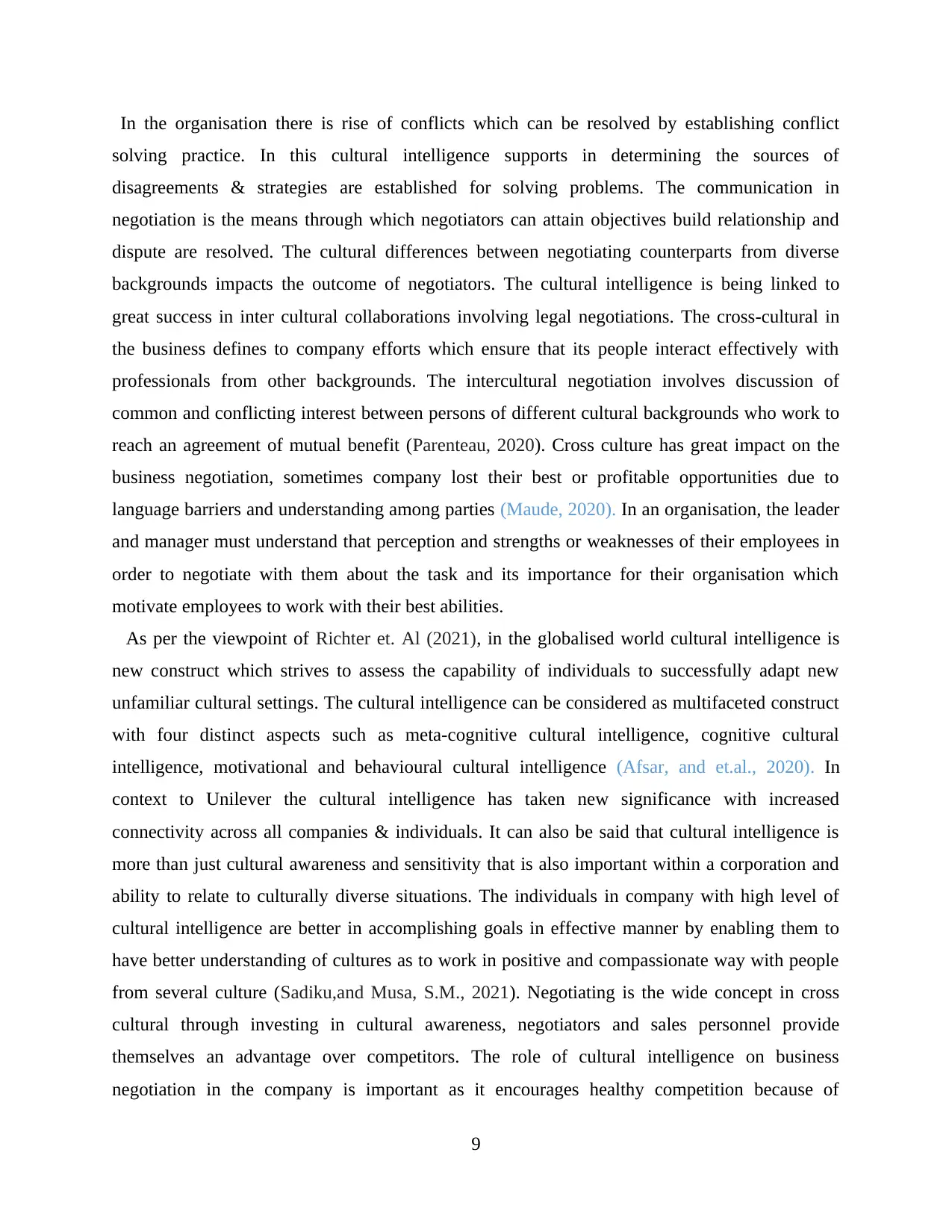
In the organisation there is rise of conflicts which can be resolved by establishing conflict
solving practice. In this cultural intelligence supports in determining the sources of
disagreements & strategies are established for solving problems. The communication in
negotiation is the means through which negotiators can attain objectives build relationship and
dispute are resolved. The cultural differences between negotiating counterparts from diverse
backgrounds impacts the outcome of negotiators. The cultural intelligence is being linked to
great success in inter cultural collaborations involving legal negotiations. The cross-cultural in
the business defines to company efforts which ensure that its people interact effectively with
professionals from other backgrounds. The intercultural negotiation involves discussion of
common and conflicting interest between persons of different cultural backgrounds who work to
reach an agreement of mutual benefit (Parenteau, 2020). Cross culture has great impact on the
business negotiation, sometimes company lost their best or profitable opportunities due to
language barriers and understanding among parties (Maude, 2020). In an organisation, the leader
and manager must understand that perception and strengths or weaknesses of their employees in
order to negotiate with them about the task and its importance for their organisation which
motivate employees to work with their best abilities.
As per the viewpoint of Richter et. Al (2021), in the globalised world cultural intelligence is
new construct which strives to assess the capability of individuals to successfully adapt new
unfamiliar cultural settings. The cultural intelligence can be considered as multifaceted construct
with four distinct aspects such as meta-cognitive cultural intelligence, cognitive cultural
intelligence, motivational and behavioural cultural intelligence (Afsar, and et.al., 2020). In
context to Unilever the cultural intelligence has taken new significance with increased
connectivity across all companies & individuals. It can also be said that cultural intelligence is
more than just cultural awareness and sensitivity that is also important within a corporation and
ability to relate to culturally diverse situations. The individuals in company with high level of
cultural intelligence are better in accomplishing goals in effective manner by enabling them to
have better understanding of cultures as to work in positive and compassionate way with people
from several culture (Sadiku,and Musa, S.M., 2021). Negotiating is the wide concept in cross
cultural through investing in cultural awareness, negotiators and sales personnel provide
themselves an advantage over competitors. The role of cultural intelligence on business
negotiation in the company is important as it encourages healthy competition because of
9
solving practice. In this cultural intelligence supports in determining the sources of
disagreements & strategies are established for solving problems. The communication in
negotiation is the means through which negotiators can attain objectives build relationship and
dispute are resolved. The cultural differences between negotiating counterparts from diverse
backgrounds impacts the outcome of negotiators. The cultural intelligence is being linked to
great success in inter cultural collaborations involving legal negotiations. The cross-cultural in
the business defines to company efforts which ensure that its people interact effectively with
professionals from other backgrounds. The intercultural negotiation involves discussion of
common and conflicting interest between persons of different cultural backgrounds who work to
reach an agreement of mutual benefit (Parenteau, 2020). Cross culture has great impact on the
business negotiation, sometimes company lost their best or profitable opportunities due to
language barriers and understanding among parties (Maude, 2020). In an organisation, the leader
and manager must understand that perception and strengths or weaknesses of their employees in
order to negotiate with them about the task and its importance for their organisation which
motivate employees to work with their best abilities.
As per the viewpoint of Richter et. Al (2021), in the globalised world cultural intelligence is
new construct which strives to assess the capability of individuals to successfully adapt new
unfamiliar cultural settings. The cultural intelligence can be considered as multifaceted construct
with four distinct aspects such as meta-cognitive cultural intelligence, cognitive cultural
intelligence, motivational and behavioural cultural intelligence (Afsar, and et.al., 2020). In
context to Unilever the cultural intelligence has taken new significance with increased
connectivity across all companies & individuals. It can also be said that cultural intelligence is
more than just cultural awareness and sensitivity that is also important within a corporation and
ability to relate to culturally diverse situations. The individuals in company with high level of
cultural intelligence are better in accomplishing goals in effective manner by enabling them to
have better understanding of cultures as to work in positive and compassionate way with people
from several culture (Sadiku,and Musa, S.M., 2021). Negotiating is the wide concept in cross
cultural through investing in cultural awareness, negotiators and sales personnel provide
themselves an advantage over competitors. The role of cultural intelligence on business
negotiation in the company is important as it encourages healthy competition because of
9
⊘ This is a preview!⊘
Do you want full access?
Subscribe today to unlock all pages.

Trusted by 1+ million students worldwide
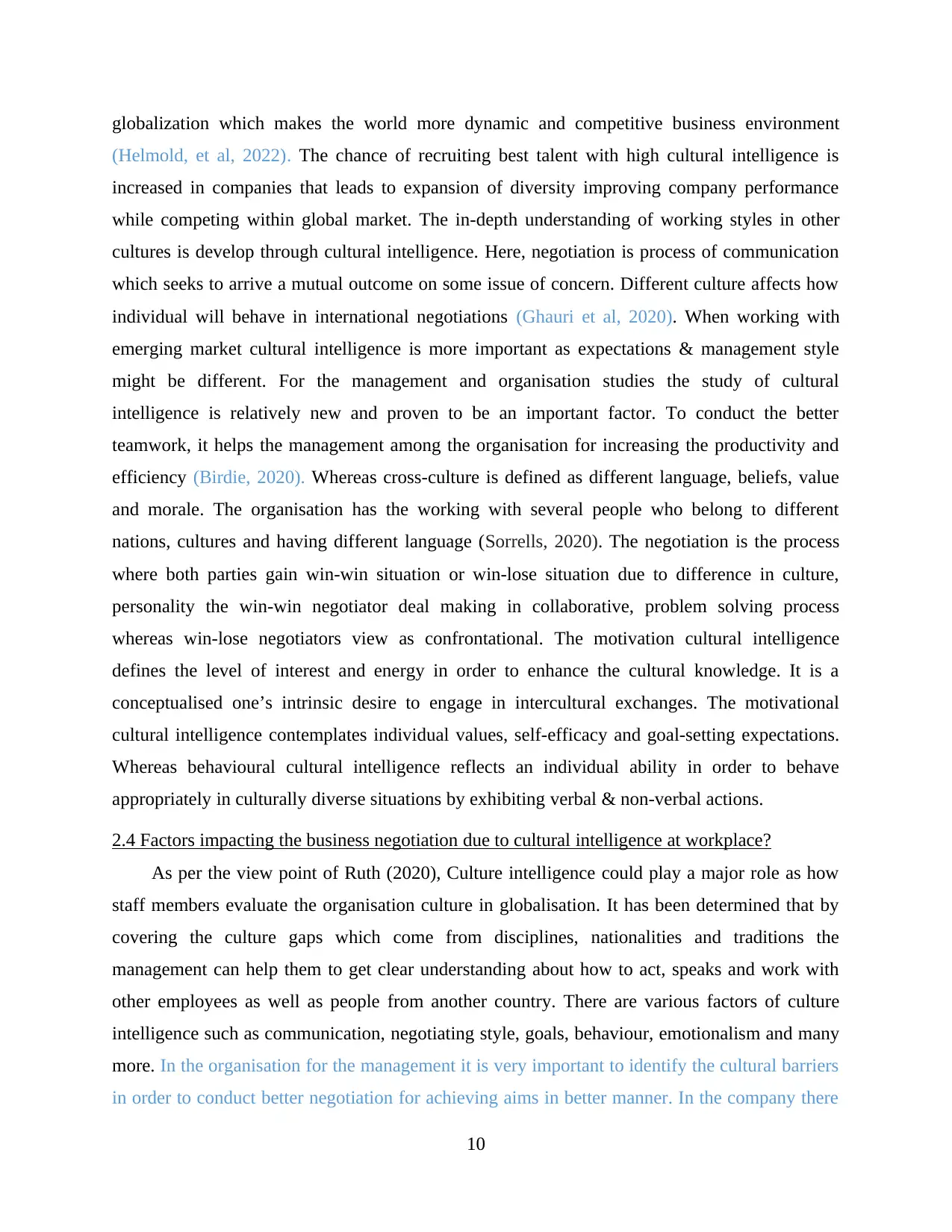
globalization which makes the world more dynamic and competitive business environment
(Helmold, et al, 2022). The chance of recruiting best talent with high cultural intelligence is
increased in companies that leads to expansion of diversity improving company performance
while competing within global market. The in-depth understanding of working styles in other
cultures is develop through cultural intelligence. Here, negotiation is process of communication
which seeks to arrive a mutual outcome on some issue of concern. Different culture affects how
individual will behave in international negotiations (Ghauri et al, 2020). When working with
emerging market cultural intelligence is more important as expectations & management style
might be different. For the management and organisation studies the study of cultural
intelligence is relatively new and proven to be an important factor. To conduct the better
teamwork, it helps the management among the organisation for increasing the productivity and
efficiency (Birdie, 2020). Whereas cross-culture is defined as different language, beliefs, value
and morale. The organisation has the working with several people who belong to different
nations, cultures and having different language (Sorrells, 2020). The negotiation is the process
where both parties gain win-win situation or win-lose situation due to difference in culture,
personality the win-win negotiator deal making in collaborative, problem solving process
whereas win-lose negotiators view as confrontational. The motivation cultural intelligence
defines the level of interest and energy in order to enhance the cultural knowledge. It is a
conceptualised one’s intrinsic desire to engage in intercultural exchanges. The motivational
cultural intelligence contemplates individual values, self-efficacy and goal-setting expectations.
Whereas behavioural cultural intelligence reflects an individual ability in order to behave
appropriately in culturally diverse situations by exhibiting verbal & non-verbal actions.
2.4 Factors impacting the business negotiation due to cultural intelligence at workplace?
As per the view point of Ruth (2020), Culture intelligence could play a major role as how
staff members evaluate the organisation culture in globalisation. It has been determined that by
covering the culture gaps which come from disciplines, nationalities and traditions the
management can help them to get clear understanding about how to act, speaks and work with
other employees as well as people from another country. There are various factors of culture
intelligence such as communication, negotiating style, goals, behaviour, emotionalism and many
more. In the organisation for the management it is very important to identify the cultural barriers
in order to conduct better negotiation for achieving aims in better manner. In the company there
10
(Helmold, et al, 2022). The chance of recruiting best talent with high cultural intelligence is
increased in companies that leads to expansion of diversity improving company performance
while competing within global market. The in-depth understanding of working styles in other
cultures is develop through cultural intelligence. Here, negotiation is process of communication
which seeks to arrive a mutual outcome on some issue of concern. Different culture affects how
individual will behave in international negotiations (Ghauri et al, 2020). When working with
emerging market cultural intelligence is more important as expectations & management style
might be different. For the management and organisation studies the study of cultural
intelligence is relatively new and proven to be an important factor. To conduct the better
teamwork, it helps the management among the organisation for increasing the productivity and
efficiency (Birdie, 2020). Whereas cross-culture is defined as different language, beliefs, value
and morale. The organisation has the working with several people who belong to different
nations, cultures and having different language (Sorrells, 2020). The negotiation is the process
where both parties gain win-win situation or win-lose situation due to difference in culture,
personality the win-win negotiator deal making in collaborative, problem solving process
whereas win-lose negotiators view as confrontational. The motivation cultural intelligence
defines the level of interest and energy in order to enhance the cultural knowledge. It is a
conceptualised one’s intrinsic desire to engage in intercultural exchanges. The motivational
cultural intelligence contemplates individual values, self-efficacy and goal-setting expectations.
Whereas behavioural cultural intelligence reflects an individual ability in order to behave
appropriately in culturally diverse situations by exhibiting verbal & non-verbal actions.
2.4 Factors impacting the business negotiation due to cultural intelligence at workplace?
As per the view point of Ruth (2020), Culture intelligence could play a major role as how
staff members evaluate the organisation culture in globalisation. It has been determined that by
covering the culture gaps which come from disciplines, nationalities and traditions the
management can help them to get clear understanding about how to act, speaks and work with
other employees as well as people from another country. There are various factors of culture
intelligence such as communication, negotiating style, goals, behaviour, emotionalism and many
more. In the organisation for the management it is very important to identify the cultural barriers
in order to conduct better negotiation for achieving aims in better manner. In the company there
10
Paraphrase This Document
Need a fresh take? Get an instant paraphrase of this document with our AI Paraphraser
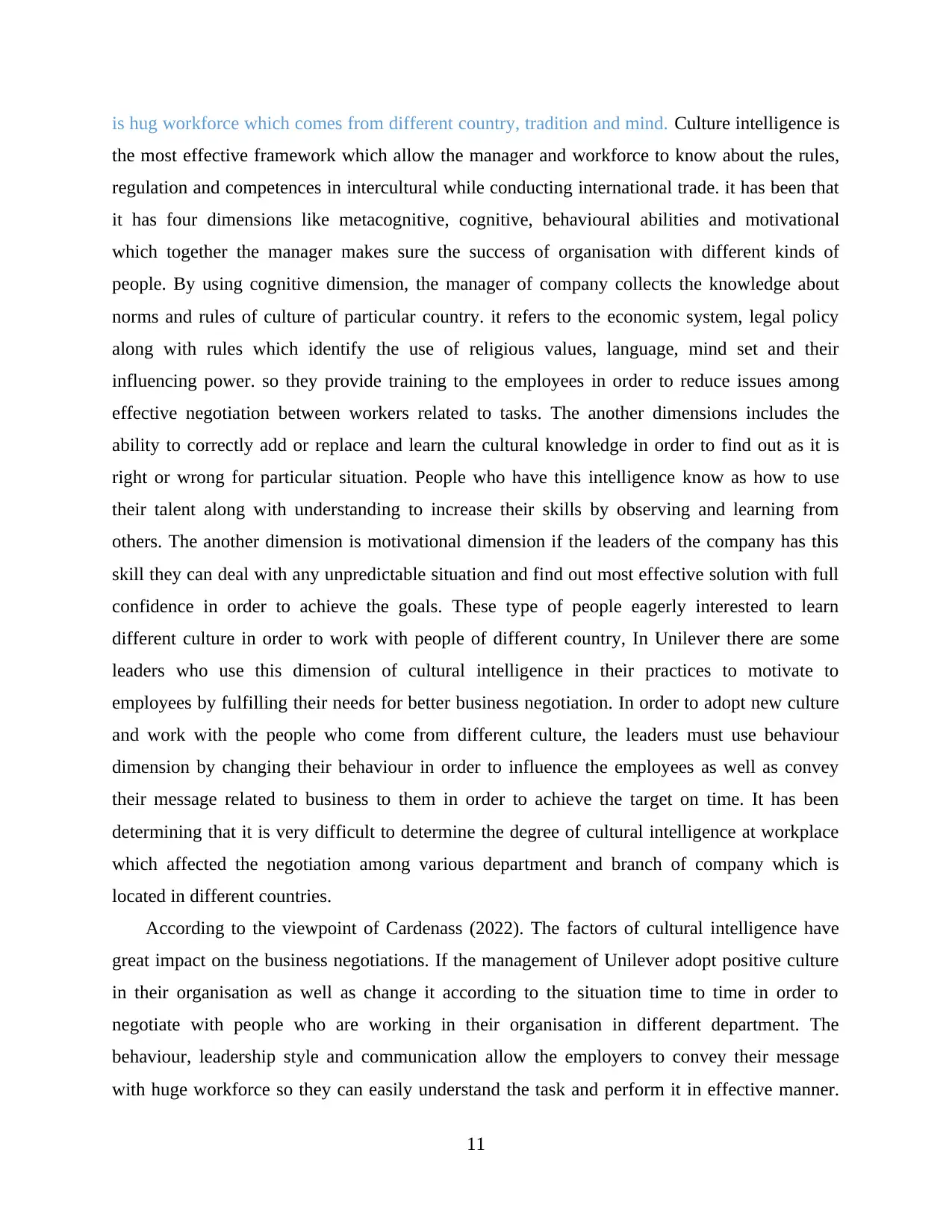
is hug workforce which comes from different country, tradition and mind. Culture intelligence is
the most effective framework which allow the manager and workforce to know about the rules,
regulation and competences in intercultural while conducting international trade. it has been that
it has four dimensions like metacognitive, cognitive, behavioural abilities and motivational
which together the manager makes sure the success of organisation with different kinds of
people. By using cognitive dimension, the manager of company collects the knowledge about
norms and rules of culture of particular country. it refers to the economic system, legal policy
along with rules which identify the use of religious values, language, mind set and their
influencing power. so they provide training to the employees in order to reduce issues among
effective negotiation between workers related to tasks. The another dimensions includes the
ability to correctly add or replace and learn the cultural knowledge in order to find out as it is
right or wrong for particular situation. People who have this intelligence know as how to use
their talent along with understanding to increase their skills by observing and learning from
others. The another dimension is motivational dimension if the leaders of the company has this
skill they can deal with any unpredictable situation and find out most effective solution with full
confidence in order to achieve the goals. These type of people eagerly interested to learn
different culture in order to work with people of different country, In Unilever there are some
leaders who use this dimension of cultural intelligence in their practices to motivate to
employees by fulfilling their needs for better business negotiation. In order to adopt new culture
and work with the people who come from different culture, the leaders must use behaviour
dimension by changing their behaviour in order to influence the employees as well as convey
their message related to business to them in order to achieve the target on time. It has been
determining that it is very difficult to determine the degree of cultural intelligence at workplace
which affected the negotiation among various department and branch of company which is
located in different countries.
According to the viewpoint of Cardenass (2022). The factors of cultural intelligence have
great impact on the business negotiations. If the management of Unilever adopt positive culture
in their organisation as well as change it according to the situation time to time in order to
negotiate with people who are working in their organisation in different department. The
behaviour, leadership style and communication allow the employers to convey their message
with huge workforce so they can easily understand the task and perform it in effective manner.
11
the most effective framework which allow the manager and workforce to know about the rules,
regulation and competences in intercultural while conducting international trade. it has been that
it has four dimensions like metacognitive, cognitive, behavioural abilities and motivational
which together the manager makes sure the success of organisation with different kinds of
people. By using cognitive dimension, the manager of company collects the knowledge about
norms and rules of culture of particular country. it refers to the economic system, legal policy
along with rules which identify the use of religious values, language, mind set and their
influencing power. so they provide training to the employees in order to reduce issues among
effective negotiation between workers related to tasks. The another dimensions includes the
ability to correctly add or replace and learn the cultural knowledge in order to find out as it is
right or wrong for particular situation. People who have this intelligence know as how to use
their talent along with understanding to increase their skills by observing and learning from
others. The another dimension is motivational dimension if the leaders of the company has this
skill they can deal with any unpredictable situation and find out most effective solution with full
confidence in order to achieve the goals. These type of people eagerly interested to learn
different culture in order to work with people of different country, In Unilever there are some
leaders who use this dimension of cultural intelligence in their practices to motivate to
employees by fulfilling their needs for better business negotiation. In order to adopt new culture
and work with the people who come from different culture, the leaders must use behaviour
dimension by changing their behaviour in order to influence the employees as well as convey
their message related to business to them in order to achieve the target on time. It has been
determining that it is very difficult to determine the degree of cultural intelligence at workplace
which affected the negotiation among various department and branch of company which is
located in different countries.
According to the viewpoint of Cardenass (2022). The factors of cultural intelligence have
great impact on the business negotiations. If the management of Unilever adopt positive culture
in their organisation as well as change it according to the situation time to time in order to
negotiate with people who are working in their organisation in different department. The
behaviour, leadership style and communication allow the employers to convey their message
with huge workforce so they can easily understand the task and perform it in effective manner.
11
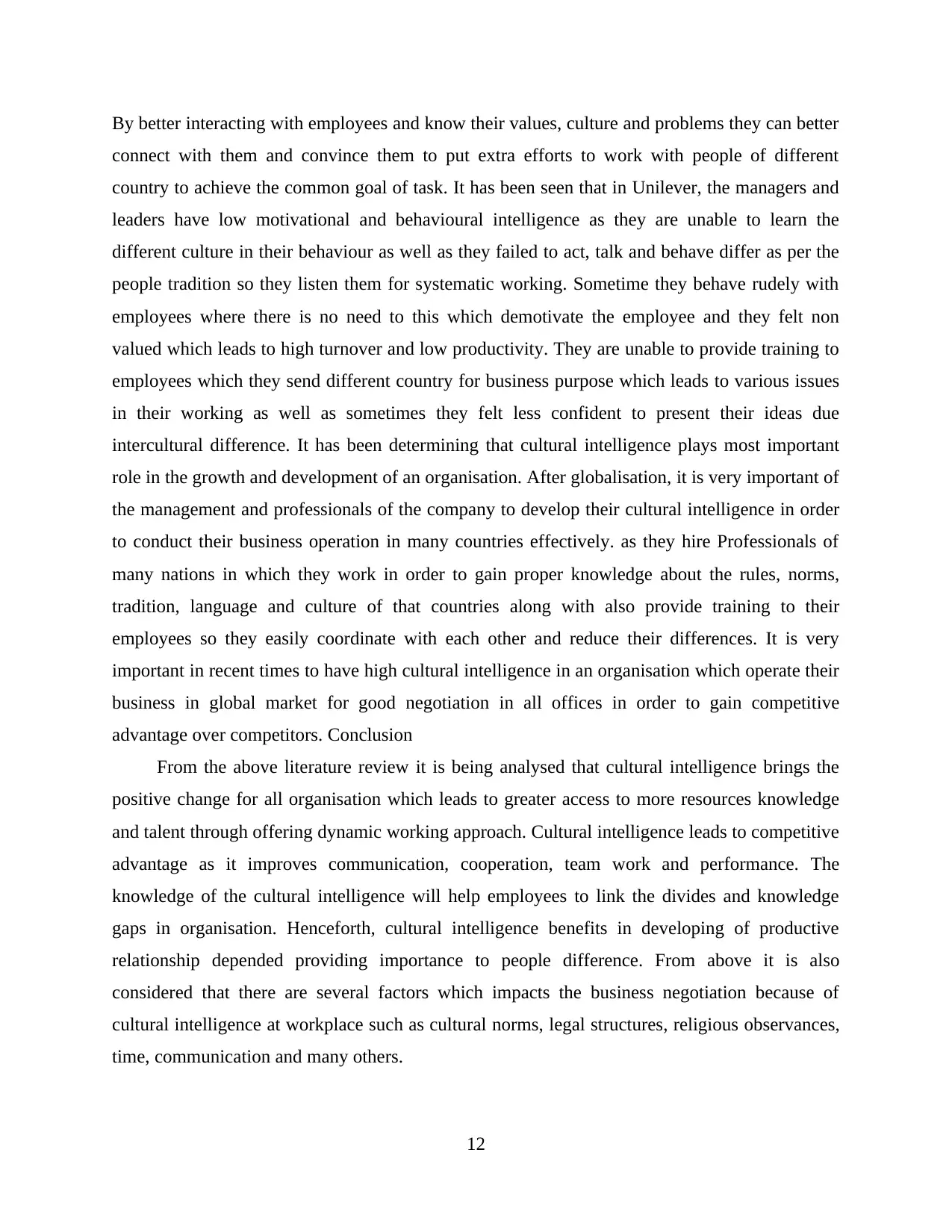
By better interacting with employees and know their values, culture and problems they can better
connect with them and convince them to put extra efforts to work with people of different
country to achieve the common goal of task. It has been seen that in Unilever, the managers and
leaders have low motivational and behavioural intelligence as they are unable to learn the
different culture in their behaviour as well as they failed to act, talk and behave differ as per the
people tradition so they listen them for systematic working. Sometime they behave rudely with
employees where there is no need to this which demotivate the employee and they felt non
valued which leads to high turnover and low productivity. They are unable to provide training to
employees which they send different country for business purpose which leads to various issues
in their working as well as sometimes they felt less confident to present their ideas due
intercultural difference. It has been determining that cultural intelligence plays most important
role in the growth and development of an organisation. After globalisation, it is very important of
the management and professionals of the company to develop their cultural intelligence in order
to conduct their business operation in many countries effectively. as they hire Professionals of
many nations in which they work in order to gain proper knowledge about the rules, norms,
tradition, language and culture of that countries along with also provide training to their
employees so they easily coordinate with each other and reduce their differences. It is very
important in recent times to have high cultural intelligence in an organisation which operate their
business in global market for good negotiation in all offices in order to gain competitive
advantage over competitors. Conclusion
From the above literature review it is being analysed that cultural intelligence brings the
positive change for all organisation which leads to greater access to more resources knowledge
and talent through offering dynamic working approach. Cultural intelligence leads to competitive
advantage as it improves communication, cooperation, team work and performance. The
knowledge of the cultural intelligence will help employees to link the divides and knowledge
gaps in organisation. Henceforth, cultural intelligence benefits in developing of productive
relationship depended providing importance to people difference. From above it is also
considered that there are several factors which impacts the business negotiation because of
cultural intelligence at workplace such as cultural norms, legal structures, religious observances,
time, communication and many others.
12
connect with them and convince them to put extra efforts to work with people of different
country to achieve the common goal of task. It has been seen that in Unilever, the managers and
leaders have low motivational and behavioural intelligence as they are unable to learn the
different culture in their behaviour as well as they failed to act, talk and behave differ as per the
people tradition so they listen them for systematic working. Sometime they behave rudely with
employees where there is no need to this which demotivate the employee and they felt non
valued which leads to high turnover and low productivity. They are unable to provide training to
employees which they send different country for business purpose which leads to various issues
in their working as well as sometimes they felt less confident to present their ideas due
intercultural difference. It has been determining that cultural intelligence plays most important
role in the growth and development of an organisation. After globalisation, it is very important of
the management and professionals of the company to develop their cultural intelligence in order
to conduct their business operation in many countries effectively. as they hire Professionals of
many nations in which they work in order to gain proper knowledge about the rules, norms,
tradition, language and culture of that countries along with also provide training to their
employees so they easily coordinate with each other and reduce their differences. It is very
important in recent times to have high cultural intelligence in an organisation which operate their
business in global market for good negotiation in all offices in order to gain competitive
advantage over competitors. Conclusion
From the above literature review it is being analysed that cultural intelligence brings the
positive change for all organisation which leads to greater access to more resources knowledge
and talent through offering dynamic working approach. Cultural intelligence leads to competitive
advantage as it improves communication, cooperation, team work and performance. The
knowledge of the cultural intelligence will help employees to link the divides and knowledge
gaps in organisation. Henceforth, cultural intelligence benefits in developing of productive
relationship depended providing importance to people difference. From above it is also
considered that there are several factors which impacts the business negotiation because of
cultural intelligence at workplace such as cultural norms, legal structures, religious observances,
time, communication and many others.
12
⊘ This is a preview!⊘
Do you want full access?
Subscribe today to unlock all pages.

Trusted by 1+ million students worldwide
1 out of 19
Related Documents
Your All-in-One AI-Powered Toolkit for Academic Success.
+13062052269
info@desklib.com
Available 24*7 on WhatsApp / Email
![[object Object]](/_next/static/media/star-bottom.7253800d.svg)
Unlock your academic potential
Copyright © 2020–2026 A2Z Services. All Rights Reserved. Developed and managed by ZUCOL.





